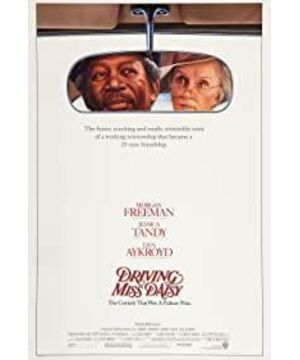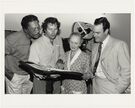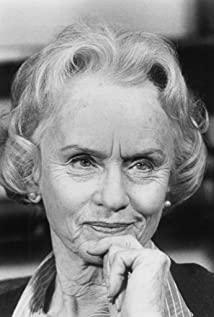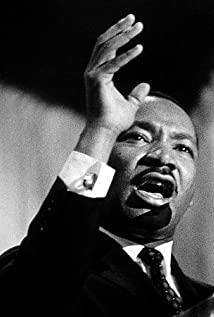It is about September of 1948. A wealthy, spunky, and independent 72 year old Jewish widow and former grade school teacher named Daisy Werthan accidentally backs her new Chrysler into her neighbors yard after having put her foot on the accelerator too far. The car is totaled and insurance company has declared her high risk. Her 35 year old son Boolie, a successful, third generation textile business owner, insists she hires a chauffeur, but she refuses to do so. For the time being, she either takes care of business herself or have one of her friends give her a ride.
Oscar, an employee of Boolie's is stuck in the freight elevator at the textile mill. Hoke Coleburn, about 60 years of age, helps him get the elevator down to the floor. Boolie notices Hoke's resourcefulness, with him being revealed as a potential chauffeur. Boolie seems disinterested, but Hoke follows him to his office and interviews with him. Hoke is given the job after Boolie's questioning of his previous employment, but warns him of his mother's stubbornness and uptightness, but assured she can't fire him.
Hoke is brought over to Daisy's house by Boolie. Daisy refuses to be formally introduced to him and doesn't want "some chauffeur" staying at her house and eating her food (a subtle hint of racism), despite the fact she's had the same black cook and housekeeper for over 20 years. A brand new 1949 Hudson sits in the garage.
Hoke tries to stay busy and earn his pay around Daisy's house, but Daisy refuses to let him touch her things. After 6 days, he informs her of the low supply of coffee, Dutch Cleanser, and silver polish. Daisy insists on taking the streetcar to the Piggly Wiggly. Hoke will not let her do it and follows her. Daisy gives in and lets him give her the lift, but sets him straight on some rules.
Afterwards, Hoke takes Daisy to the Reform Jewish temple she regularly attends. When the service is over, he's parked in the front of the church and wants to give her the VIP treatment, but she is embarrassed. He does not understand her modesty despite her wealth and reminds him of her poor upbringing. But she needs a chauffeur and he needs the job and should just leave it at that.
A few weeks later on a cold and foggy morning, Daisy notices a can of salmon missing from her pantry. She calls Boolie over about the incident and that Hoke is not someone she can trust because "they all take things". Boolie tries to defend him, but she refuses and feels she's being invaded. Hoke and Idella, Daisy's maid, arrive for work soon afterwards. Boolie asks Hoke that they have a talk and he agrees. But before they talk, Hoke tells Daisy he ate a can of her salmon last night because the leftover pork chops were too stiff and that he bought a replacement can for her. The incident is immediately forgotten and it turns out Hoke is a man that can be trusted.
It is the summer of 1951. Daisy and Hoke are at the cemetery with Daisy's husband's grave plot being tended. She asks Hoke to place flowers on a Leo Bauer grave and gives him the directions to it. He reveals to her that he can't read. Daisy does not understand this, but reassures him in a rather harsh manner that he can read if he knows his ABC's. She gives him the basics and he finds the grave.
Christmas Day 1953. Daisy's daughter in law Florine is having a fit because there is no coconut for ambrosia, despite the lavish and generous potluck for the guests. Her new cook Katie Bell did not write it down, but told her to buy it ( Another hint of illiteracy common among blacks). Boolie assures her it's okay. Daisy and Hoke are coming over to Boolie's house. Hoke is enjoying the Christmas lights in the neighborhood, but Daisy is somewhat appalled by the crass commercialism of Christmas, plus her overall disdain for her daughter in law's refusal to adhere to Jewish tradition. And by this time, Hoke can read well. Daisy hands him a book on calligraphy to help him practice on his writing, but assures it's not a Christmas present.
Summer of 1955, Boolie and Hoke are over at the local Cadillac dealership to purchase a 1956 Cadillac Sedan DeVille for Daisy. Hoke made a deal with the car dealer to purchase Daisy's 1949 Hudson, with Boolie surprised about the purchase from the dealer instead of his mother. But Hoke assures Boolie it's okay and does not want to make car payments to her.
A short time later, Daisy is prepared for a long journey to Mobile, Alabama to celebrate her brother Walter's 90th birthday. She's fretting that they will be late despite being well-prepared. Hoke pulls up to help her out, followed by Boolie in a nice black 1956 Cadillac Eldorado. Daisy is appalled that Boolie is leaving early for a convention in New York City, because Florine would rather see the play My Fair Lady before then, instead of attending Walter's birthday.
Daisy and Hoke begin a 300+ mile journey, which was a long way to drive before interstate highways. Hoke reveals to her it is the first time he's ever left the state of Georgia. They stop to eat a lunch of sandwiches, deviled eggs, peaches, and Coca Cola on the side of the road near a pond. Daisy tells a story to Hoke about her trip there in 1888 when her brother got married and how timid she was when she saw an ocean for the first time. They are interrupted by two racist cops questioning Hoke's possession of the car. Daisy tells them it's her car, they see her registration and Hoke's driver's license. A stern reminder of how dangerous it was for minorities to travel back then. They move on, Daisy has given Hoke the wrong directions, and has held back their journey for a little while.Hoke tells Daisy he needs to use the bathroom on the side of the road, since coloreds cannot use filling station restrooms, but she refuses to let him do so. Hoke lays his foot down that he needs to go and that he's almost 70 years old and doesn't need to be treated like a nobody or a child. Daisy and Hoke make it to Walter's and celebrate the birthday.
It is May of 1963. Hoke is paying a visit to Boolie's textile factory. As her walks through, the old textile weaving machines have been replaced by more efficient Saco-Lowell spool machines with fewer workers needing to tend to them. Hoke reveals a wife of Boolie's cousin is trying to hire him and to "name his own salary". Boolie catches on and realizes Hoke is really asking for a raise. He's offered $65 a week, but Hoke asks for $75 and Boolie agrees to it. Hoke is exceptionally pleased and thanks Boolie for it and having been fought for.
Soon afterwards, Daisy's longtime cook and housekeeper Idealla dies in her kitchen of a heart attack while shelling peas. She, Hoke, Boolie, and Florine attend the funeral at Idella's Missionary Baptist Church to pay their respects.
That night, Daisy is in the kitchen preparing a meal of fried chicken, biscuits, rice, and okra for her and Hoke. Hoke is now helping her out with the household tasks, including setting up a garden, which Daisy previously protested.
Sometime in the winter of 1963 or 1964, a rare snow and ice storm is ravaging Atlanta. Daisy's electricity is out in her home, but Hoke comes to work that day anyway and with some coffee from the Krispy Kreme. Her son calls to check on her and surprised at her kind comments about Hoke coming over to help and insults her for it.
*About January of 1965, Boolie is awarded Businessman of the Year by the Atlanta Business Council detailing of his grandfather Werthan starting the business on Decatur Rd. and where it is now.
*Daisy's car is now a blue 1965 Cadillac Sedan DeVille. She and Hoke have been stuck in traffic. Daisy does not get to go to the Jewish Temple for worship and it's revealed to her the temple was bombed. She does not seem to understand why , but realizes after Hoke tells her a story of a boyhood friend of his whose father was hanged that she is almost as much a victim of racism and prejudice as he is.
Boolie pays a visit to Daisy at her home revealing his reluctance to attend the speech of Martin Luther King, despite his admiration for him, because it might hurt his business clientele in the future. He suggests she asks Hoke to go, despite her reluctance.
*On January 27, 1965, Daisy attends a speech by Martin Luther King at the Dinkier Plaza Hotel. On the way there, she indirectly offers Hoke to join her, but he is offended at her for doing it at the last minute and that times have not really changed all that much, despite her claim that they are. Instead, she attends the speech alone and Hoke sits in the car listening on the radio. Daisy realizes from the speech that she is probably more guilty of what's happened over the years than the overt racists that have said hateful things and incited violence.
It is the fall of 1971. Hoke is now driving Daisy's 1965 Cadillac and her car is now a 1970 Cadillac Fleetwood. By this time, he is in his early 80's and she is 95 years old. He enters her home with his usual morning greeting , but she does not respond at first. Soon afterwards, she comes downstairs still in her nightgown and thinking she's a schoolteacher needing to find graded papers. Suffering from dementia, Hoke calls Boolie to come over to help. After having calmed down and with her mind back in place, Daisy declares Hoke as her best friend and that it's sincere. She takes his hand.
Thanksgiving Day, November 22, 1973. Hoke is now about 85 years old. His glasses are very thick. His granddaughter Michelle is dropping him off at Daisy's house, which has just been sold. Boolie is now about 60 years old and driving a 1973 Mercedes. He and Hoke have one last visit to the now empty house. Boolie takes him over to the retirement home Daisy is staying at. By this time, she is 97 years old and using a walker. She barely acknowledges their presence at fist, but later insists Hoke stay with her alone. Mostly small talk, but they are enjoying each others company. Hoke gently feeds her pumpkin pie she has not yet eaten and the screen fades to an old automobile of Daisy's driving away. This is possibly the last time they saw each other.
View more about Driving Miss Daisy reviews











